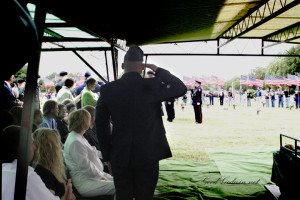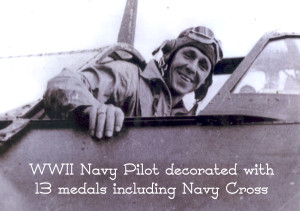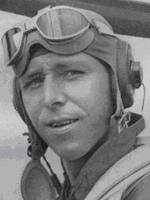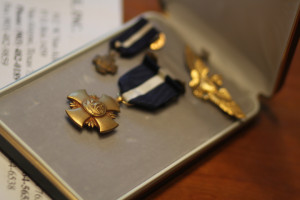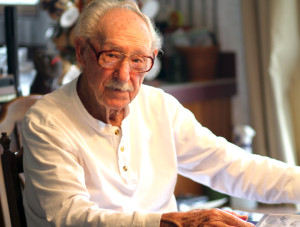I’m honoring veterans this week.
I took this photo in 2007 and it’s one of my all-time favorites. Airman Bill Long stands in salute as a mournful “Taps” sounds from a single trumpet at the graveside services for Long’s brother, Spc. Braden Joseph Long Sunday afternoon, Aug. 19, at Cedarlawn Memorial Park in Sherman.
Spc. Long was killed in battle in Iraq Aug. 4, 2007. In the background of the picture is an honor-guard detail from the Sherman Police Department, also standing in salute and further back is part of the Patriot Guard line surrounding the grave site holding U.S. flags. Members of the Sherman Fire Department were also present to honor Sherman’s fallen warrior.
The story of Spc. Braden Joseph Long, by Joyce Godwin appeared in the Herald Democrat Aug. 20, 2007.
A 2005 graduate of Sherman High School, he is remembered for his infectious smile, love of cars, love for his family and the intense desire to serve his country.
Spc. Long died of injuries sustained when his Humvee came under grenade attack in Baghdad just three days shy of his 20th birthday. He was assigned to the 1st Squadron, 4th Cavalry Regiment, 4th Infantry Brigade Combat Team, 1st Infantry Division, Fort Riley, Kan.
During his short military career, Spc. Long earned the Bronze Star, Purple Heart, Army Commendation Medal, Good Conduct Medal, Combat Action Badge, Iraqi Campaign Medal and Global War on Terrorism Medal. He served as a gunner.
Chaplain Ken Sorenson told mourners at Faith Church of Sherman that one of the outstanding features of Spc. Long was his smile. His father added in a later telephone interview that his son’s smile was always there. Sorenson used the letters in ‘smile’ to describe Spc. Long to family and friends who flocked to his funeral. ‘S’ was for Specialist, Braden’s army rank. ‘M’ was for military. He said Spc. Long wanted to join the military since he was a little boy. ‘I’ was for his intelligence in choosing a supportive wife like Teresa and for choosing the Army. ‘L’ stood for likeable. Sorenson said Spc. Long was an incredibly loving person. “I can see why Teresa would fall in love with him,” Sorenson said.
Lastly, ‘E’ stood for excellence. He described Spc. Long as determined to do the right thing. He would always fulfill his commitments.
Sorenson referred to the scripture Romans 5:7-8. “Christ died for us. There is something about a man who is willing to die for those he doesn’t even know…day after day, a willingness to sacrifice his all for people who didn’t know him, much like his Savior did 2,000 years ago,” he said.
Later in the service, Sorenson said, “Freedom is never free and his (Spc. Long’s) death serves as a reminder of the cost.”
Following the final prayer, the slow cadence of marching military began to echo across the auditorium and grew louder as the military honor guard advanced through the church isle to retrieve Spc. Long’s casket.
Mourners poured from the church and the unmistakable roar of motorcycle engines could be heard as the Patriot Guard prepared to escort Spc. Long and his family to Cedarlawn Memorial Park for the final farewell. This was the third part of the Guard’s mission for Spc. Long.
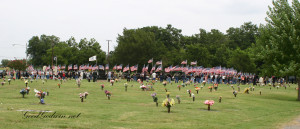
The Patriot Guard escorted Spc. Graden Long from the time he arrived at the Grayson County Airport to his final resting place at Cedarlawn Park in Sherman. Seen here, the flag bearers formed a wall around the graveside and mourners to protect them from possible intruders/disrupters.
Riders met the plane bearing Spc. Long’s casket at Grayson County Airport the Thursday, Aug. 16, and escorted him to Waldo Funeral Home in Sherman. Then the Guard stood in a protective formation around the funeral home during the family’s visitation Friday.
With flags unfurled in the wind, the motorcycles escorted Spc. Long and his family and friends to Cedarlawn.
As the procession passed each police sentry at various intersections on the procession route through Sherman, the officer sentry boarded his unit with lights flashing and joined the end of the procession until there were 10 cruisers bringing up the rear.
Sherman firefighters also honored the fallen hero with a giant U.S. flag suspended between two ladder trucks for the procession to pass under as it turned into Cedarlawn from Texoma Parkway. From that point, the procession stretched west on FM 691 all the way to U.S. Highway 75.
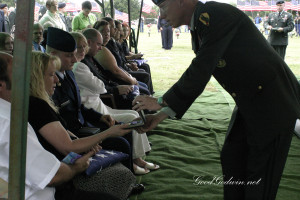
A U.S. Army representative presents the purple heart to Spc. Braden Long’s mother at the close of his funeral at the raveside service for Spc. Braden Joseph Long Aug. 19, 2007, at Cedarlawn Memorial Park in Sherman.
Inside the funeral tent, the awards earned by Spc. Long were each presented to his wife, Teresa, his mother, Melanie Thrasher, and his father.
When a mournful “Taps” sounded out from a single trumpet, military and police alike raise their hands in salute. Then Airman Bill Long, Spc. Long’s older brother who was sitting with the family, stood slowly, turned toward the ceremony and raised his salute. Airman Long, served as escort for his brother’s final return to Sherman. He was his mother’s support along with her husband, Bobby Thrasher, throughout the services.
Hours after the funeral, Spc. Long’s father described their son as a normal teen while he was growing up. “But then, when you look back, you see a teen that almost never caused trouble,” William Long said. “He was focused in wanting to go into the Army and that’s what he did. He was a fantastic kid and a wonderful husband for his wife, and we are really going to miss him.”
William Long commented on the military honors during his son’s service. “The amount of people that showed up was way beyond our expectations,” he added. “We knew the Patriot Guard was coming but we didn’t know how many there would be.”
Sparky Cox of Sherman served as one of the Ride Captains for the Patriot Guard along with Mike Grove of Bells and Gary Winters of Sherman. Cox reported there were 129 motorcycles and several cars carrying Patriot Guard members who came from as far away as Waurika, Okla to the north and Fort Worth and Garland to the South.
William Long said his son was doing what he wanted. “He wanted to join and signed up and enlisted right after his 17th birthday, but couldn’t go in for basic training until eight months later,” William Long said. “He was unbelievably proud to wear the uniform and his whole family was very proud of him.”
Spc. Long was sworn into the Army Oct. 2, 2004. He left for basic training June 28, 2005 at Fort Knox, Ky. He was deployed to Iraq Feb 8, 2007.
He is the fourth military personnel, and the fifth over all, from the Texoma area to die while serving in support of the war against terrorism.
If you know a veteran, get him or her to tell their story. They all have one worth hearing and remembering. #tellaveteransstory #thankavet #honorveterans

